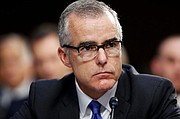WASHINGTON -- Sen. Lindsey Graham, chairman of the Senate Judiciary Committee, vowed Sunday to investigate whether the top officials at the Justice Department and the FBI plotted an "attempted bureaucratic coup" to remove President Donald Trump from office.
Graham, R-S.C., was reacting to an interview in which former FBI Deputy Director Andrew McCabe confirmed an earlier New York Times report that Deputy Attorney General Rod Rosenstein had suggested wearing a wire in meetings with Trump and that Justice Department officials had discussed recruiting Cabinet members to invoke the 25th Amendment to remove Trump from office.
Rosenstein has disputed the account.
"There's an allegation by the acting FBI director at the time that the deputy attorney general was basically trying to do an administrative coup, take the president down [through] the 25th Amendment process," Graham said in an appearance on CBS' Face the Nation. "The deputy attorney general denies it. I promise your viewers the following: that we will have a hearing about who's telling the truth, what actually happened."
He added: "I'm going to do everything I can to get to the bottom of Department of Justice, FBI behavior toward President Trump and his campaign."
Asked by the program's host, Margaret Brennan, if he would subpoena McCabe and Rosenstein to testify, Graham said, "How can I not if that's what it takes?"
A Democratic member of the Judiciary Committee, Sen. Chris Coons of Delaware, agreed with Graham that McCabe's remarks "deserve scrutiny." But he took issue with Graham's characterization of the situation.
"I don't think that this frankly rises to the level of some deep-state conspiracy or a serious attempt at what Sen. Graham called an 'administrative coup,'" said Coons, also speaking on Face the Nation. "I suspect that once this is fully discussed, it'll be clearer that this was a brief or passing conversation that's been taken out of context."
McCabe made the remarks in an interview with the CBS program 60 Minutes, released in part Thursday in advance of its full airing Sunday evening. He said Justice Department officials became so alarmed by Trump's decision in May 2017 to fire James Comey, the FBI director, that they discussed whether to recruit Cabinet members to invoke the 25th Amendment, which outlines the succession plan should the president become incapacitated, resign or die in office.
In a clip of the interview aired Sunday on Face the Nation, McCabe said he spoke to the president just after Comey was fired and that he subsequently ordered the bureau's team investigating Russia's election interference to look into whether Trump had obstructed justice by firing Comey. The FBI also began examining whether Trump had been working on behalf of Russia against U.S. interests.
McCabe said he and others were "concerned about a national security threat."
Rosenstein was "counting votes or possible votes" among Cabinet members on whether to oust Trump, McCabe told CBS' Scott Pelley.
He continued: "And the idea is, if the president committed obstruction of justice, fired the director of the FBI to negatively impact or to shut down our investigation of Russia's malign activity and possibly in support of his campaign, as a counterintelligence investigator you have to ask yourself, 'Why would a president of the United States do that?'"
He added, "So all those same sorts of facts cause us to wonder, is there an inappropriate relationship, a connection between this president and our most fearsome enemy, the government of Russia?"
The 25th Amendment establishes the process for the Cabinet to force the president's removal if he is unable to perform his duties.
McCabe's spokesman said in a statement Friday that he did not participate in any "extended discussions" about using the 25th Amendment, nor was he aware of any.
Rosenstein has disputed previous reports describing allegations by McCabe that he had discussed the topic. The Justice Department again pushed back in a statement last week.
On Sunday, Graham described the issue as one of national concern.
McCabe "went on national television and he made an accusation that floors me. ... We're going to find out what happened here, and the only way I know to find out is to call the people in under oath and find out, through questioning, who's telling the truth, because the underlying accusation is beyond stunning," the senator said.
McCabe was fired by Jeff Sessions, the attorney general at the time, on the eve of his retirement in March 2018, after being accused of a lack of candor. The 60 Minutes interview was part of a book tour to promote his memoir, The Threat: How the FBI Protects America in the Age of Terror and Trump, which will be released this week.
Information for this article was contributed by Sheryl Gay Stolberg of The New York Times and by Felicia Sonmez and Matt Zapotosky of The Washington Post.
A Section on 02/18/2019


